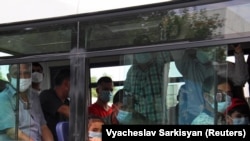Turkmenistan, an authoritarian Central Asian republic, has reported no COVID-19 cases since the start of the pandemic. The World Health Organization’s pandemic dashboard indicates that there have been zero COVID-19 infections, hospitalizations or deaths in Turkmenistan.
The WHO database relies on information provided by national health authorities. The WHO expects that information to be accurate, as each country is legally bound to implement the body of International Health Regulations adopted in 1969.
Until recently, WHO officials refrained from publicly questioning Turkmenistan’s official data. On November 9, however, WHO senior emergencies officer Catherine Smallwood told BBC News that it is doubtful that a country could have remained free of a virus while it “has been spreading worldwide as a pandemic for almost two years now.”
“From the scientific point of view, it's unlikely that the virus is not circulating in Turkmenistan,” Smallwood said.
Smallwood is most likely correct. News stories and other secondhand reports suggest that Turkmenistan hasn’t escaped the pandemic. They include reports that the country keeps a second set of COVID-19 statistics under wraps.
In July 2020, Kemal Uckun, a 57-year-old Turkish diplomat, died in Turkmenistan after a brief illness. Turkish authorities later confirmed that he died from COVID-19. Authorities in Turkmenistan denied the diagnosis. (Turkmenistan’s President Gurbanguly Berdymukhamedov and his regime are known for making very little information public.)
In December 2020, Uckun’s widow, Guzide, sued Turkey’s foreign ministry, saying the country failed to evacuate her husband from Turkmenistan for treatment. Radio Free Europe/Radio Liberty (RFE/RL) quoted a Turkish embassy official as saying that, “Turkmen officials refused to allow a Turkish plane to come to Turkmenistan to transport Uckun home because they did not want the world to know that coronavirus was in their country.”
(Editor’s note: RFE/RL is a sister U.S. government-funded news agency to VOA.)
In September, Turkmen human rights and civilian union groups wrote to the WHO stating that “[a]lmost all foreign diplomatic representations in Turkmenistan temporarily suspended work and stopped receiving citizens in person, which is indirect confirmation that coronavirus is widespread in the country.”
The letter urged the WHO to call on Turkmenistan to enact public safety protocols and allow independent COVID testing.
“According to reports from numerous sources, hospitals are overflown in the capital and the regions,” the letter said. “We are convinced that the number of deaths from COVID-19 is far higher, but it is not possible to confirm the cause of death as coronavirus, as relatives and health workers are afraid to share information.”
Health authorities in Turkmenistan have compiled a secret COVID database indicating some 25,000 deaths in the country from the virus, RFE/RL’s Turkmen service reported in October. The real numbers are likely much higher, because “regional health workers were downplaying the scale of the pandemic,” a source in the Turkmen health ministry told RFE/RL.
The U.S. embassy in Turkmenistan said that it “has received reports of local citizens with symptoms consistent with COVID-19 undergoing COVID-19 testing and being placed in quarantine in infectious diseases hospitals.”
However, “Turkmenistan has not officially acknowledged any cases of COVID-19 within its borders and may be disinclined to do so if cases were confirmed,” the embassy said.
The U.S. Centers for Disease Control and Prevention recommends that Americans avoid travel to Turkmenistan. “Because the current situation in Turkmenistan is unknown, even fully vaccinated travelers may be at risk for getting and spreading COVID-19 variants,” the CDC warned.
When the BBC asked Smallwood whether Turkmenistan was providing false data to the WHO, she refrained from a direct answer, saying it is important to build a dialogue with Turkmen authorities rather than “make statements that may not in fact lead to the type of actions that we would want to see.”
According to the WHO, Turkmenistan had administered some 7.6 million COVID-19 vaccine doses as of last August. The country’s population is about 6.2 million.
In November Turkmenistan extended quarantine-like measures first imposed in August. The authorities provided no explanation for the restrictions, which included closing restaurants and street markets.
“The bodies of those who have died of COVID-19-like lung diseases were being delivered to their relatives in special plastic bags, and the number of fresh graves across the country was increasing exponentially,” the RFE/RL Turkmen service reported.
The word "coronavirus" has been banned in Turkmenistan, and removed from the public vocabulary, Reporters Without Borders reported in April 2020.
The website of Turkmenistan’s health ministry does not mention COVID-19 but recommends “wearing masks over nose and mouth, keeping a two-meter distance from each other in public places and following personal hygiene” – for “health improvement.”
In July 2020, the health ministry said people needed to wear masks to protect themselves from a “high concentration of dust in the air.”





